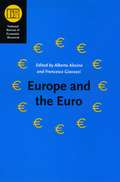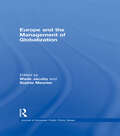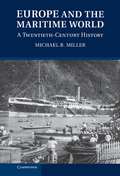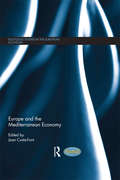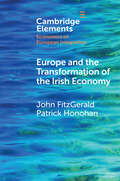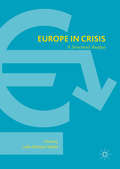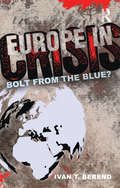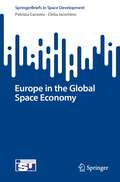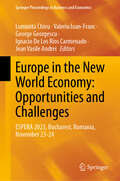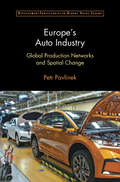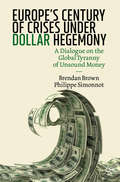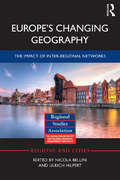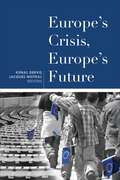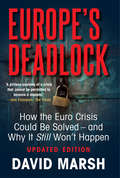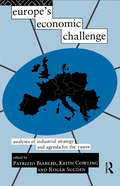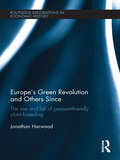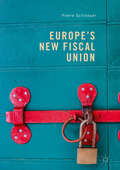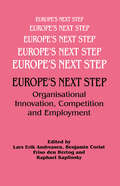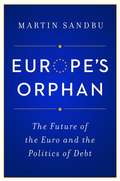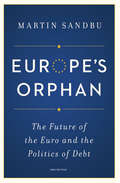- Table View
- List View
Europe and the Euro
by Alberto Alesina Francesco GiavazziIt is rare for countries to give up their currencies and thus their ability to influence such critical aspects of their economies as interest and exchange rates. Yet ten years ago a number of European countries did exactly that when they adopted the euro. Despite some dissent, there were a number of arguments in favor of this policy change: it would facilitate exchange of goods, money, and people by decreasing costs; it would increase trade; and it would enhance efficiency and competitiveness at the international level. A decade is an ideal time frame over which to evaluate the success of the euro and whether it has lived up to expectations. To that aim, Europe and the Euro looks at a number of important issues, including the effects of the euro on reform of goods and labor markets; its influence on business cycles and trade among members; and whether the single currency has induced convergence or divergence in the economic performance of member countries. While adoption of the euro may not have met the expectations of its most optimistic proponents, the benefits have been many, and there is reason to believe that the euro is robust enough to survive recent economic shocks. This volume is an essential reference on the first ten years of the euro and the workings of a monetary union.
Europe and the Financial Crisis
by Leila Simona Talani Pompeo Della PostaThe global financial and economic crisis has brought about many effects that are still difficult to interpret univocally. This book studies the consequences of the crisis on Europe by examining the effects on the European institutional setup, governance and architecture and by studying in detail the different member countries.
Europe and the Financial Crisis
by Leila Simona Talani Pompeo Della PostaThe global financial and economic crisis has brought about many effects that are still difficult to interpret univocally. This book studies the consequences of the crisis on Europe by examining the effects on the European institutional setup, governance and architecture and by studying in detail the different member countries.
Europe and the Management of Globalization (ISSN)
by Sophie Meunier Wade JacobyEuropean politicians often speak of their efforts to 'manage globalization.' At one level, this is merely a rhetorical device to make globalization more palatable to citizens and prove that policy-makers are still firmly in control of their country’s fate. This volume argues that the advocacy of managed globalization goes beyond rhetoric and actually has been a primary driver of major European Union (EU) policies in the past twenty years. The EU has indeed tried to manage globalization through the use of five major mechanisms: 1) expanding policy scope 2) exercising regulatory influence 3) empowering international institutions 4) enlarging the territorial sphere of EU influence, and 5) redistributing the costs of globalization. These mechanisms are neither entirely novel, nor are they always effective but they provide the contours of an approach to globalization that is neither ad hoc deregulation, nor old-style economic protectionism.The recent financial crisis may have seemed initially to vindicate the European efforts to manage globalization, but it also represented the limits of such efforts without the full participation of the US and China. The EU cannot rig the game of globalization, but it can try to provide predictability, oversight, and regularity with rules that accommodate European interests.This book was based on a special issue of Journal of European Public Policy.
Europe and the Maritime World
by Michael B. MillerEurope and the Maritime World: A Twentieth-Century History offers a new framework for understanding globalisation over the past century. Through a detailed analysis of ports, shipping and trading companies whose networks spanned the world, Michael B. Miller shows how a European maritime infrastructure made modern production and consumer societies possible. He argues that the combination of overseas connections and close ties to home ports contributed to globalisation. Miller also explains how the ability to manage merchant shipping's complex logistics was central to the outcome of both world wars. He chronicles transformations in hierarchies, culture, identities and port city space, all of which produced a new and different maritime world by the end of the century.
Europe and the Mediterranean Economy (Routledge Studies In The European Economy Ser. #25)
by Joan Costa-FontWith the creation of the Mediterranean partnership and the recent move towards the creation of the Union for the Mediterranean in 2008, a new emphasis is placed on the Mediterranean in the study of European Integration. This book brings together a collection of experts to address this important new area of study and discuss issues such as development, aid, labour, markets, human capital investment, Europeanization and institutional reform.
Europe and the Transformation of the Irish Economy (Elements in Economics of European Integration)
by Patrick Honohan John FitzGeraldHaving stagnated for decades in the shadow of the UK, the Irish economy's performance improved after it joined the European Union (EEC) in 1973. This Element shows how the challenge of EU membership gave focus and direction to Irish economic policy. No longer dependent on low value-added agricultural exports to Britain, within the EU Ireland became a hub for multinational corporations in IT and pharmaceutical products. This export success required and facilitated a strengthening of education and social policy infrastructures, and underpinned the achievement of high average living standards. EU membership has also brought challenges, and several severe setbacks have resulted from Irish policy mistakes. But the European flavour of Ireland's structural policies (leavened with exposure to US experience) has helped it navigate the hazards of hyper-globalization with fewer political tensions than seen elsewhere.
Europe as the Would-be World Power: The EU at Fifty
by Giandomenico MajoneFor fifty years European integration has been pursued according to an operational code based on rules which have never been publicly discussed. This book demonstrates the far-reaching consequences of the prioritisation of integration over competing values, fait accompli and other implicit rules of action. The willingness to sacrifice democracy on the altar of integration is demonstrated by the monopoly of legislative initiative granted to the non-elected Commission. Monetary union preceding, rather than following, political integration is a striking example of fait accompli, and the reason behind many holes in the EU system of economic governance. Until now, academics have avoided radical criticism; Giandomenico Majone argues that only an open acknowledgement of the obsolescence of the traditional methods can stem the rising tide of Euro-scepticism.
Europe in Crisis
by Leila Simona TalaniWith contributions from a range of expert scholars in European economics, politics and social policy, this edited collection analyses the crisis in Europe by exploring the structural asymmetries of the Economic and Monetary Union (EMU) and European monetary integration. Structured in two parts, the chapters in this book discuss the impact of the global financial crisis on the Euro area; the failed implementation of the Lisbon Strategy; wage imbalances in the European labour market; the development of EU financial regulation; the Greek debt crisis; and the relationship between Italy and the EMU. The conclusion to the book puts forward a potential way out of the European crisis and argues that the correct measures, thus far, have not been taken to bolster financial stability. In Europe in Crisis, Talani and her contributors aim to identify the impact of the crisis on the future of the EMU and the EU project as a whole.
Europe in Crisis: Bolt from the Blue? (Variorum Collected Studies #739)
by Ivan BerendThis book analyzes the European Great Recession of 2008-12, its economic and social causes, its historical roots, and the policies adopted by the European Union to find a way out of it. It contains explicit debates with several economists and analysts on some of the most controversial questions about the causes of the crisis and the policies applied by the European Union. It presents the cases of Iceland, Greece and Ireland, the countries that first declined into crisis in Europe, each of them in a different way. Iceland is a case study for reckless banking practices, Greece of reckless public spending, and Ireland of reckless household indebtedness. At least seven other countries, mostly from the peripheries of Europe, had similarly reckless banking and spending practices. In the center of the book are the economic and social causes of the crisis. Contemporary advanced capitalism became financialized, de-industrialized and globalized and got rid of the "straitjacket" of regulations. Solid banking was replaced by high-risk, "casino-type" activity. The European common currency also had a structural problem — monetary unification without a federal state and fiscal unification. The other side of the same coin is European hyper-consumerism. A new lifestyle emerged during two super-prosperous periods in the 1950s to 1960s, and during the 1990s to 2006. Trying to find an exit policy, the European Union turned to strict austerity measures to curb the budget deficit and indebtedness. This book critically analyzes the debate around austerity policy. The creation of important supra-national institutions, and of a financial supervisory authority and stability mechanisms, strengthens integration. The correction of the euro’s structural mistake by creating a quasi-fiscal unification is even more important. The introduction of mandatory fiscal rules and their supervision promises a long-term solution for a well-functioning common currency. These measures, meanwhile, create a two-tier European Union with a fast-track core. This book suggests that the European Union will emerge stronger from the crisis. This book will be of particular interest to students and researchers of economics, history, political science and international finance, but will also prove profitable reading for practitioners and the interested public.
Europe in the Global Space Economy (SpringerBriefs in Space Development)
by Clelia Iacomino Patrizia CaraveoThis book analyzes the policies and space economy programs of major space-faring nations and explores whether the present institutional set-up in Europe is adequate to address the challenges. At the core of the discussion are the relative roles of governments and markets in a highly dynamic panorama that involves advancements in science, modifications in technology and organization, and the introduction of new rules of behavior. After a close examination of the history of development of the space economy, and the shift from the centralized model to deregulation and the opening up of space activities to commercial companies, a wide-ranging overview of global space governance is provided. National and regional perspectives are discussed, and the current role of commercial actors in the global space system is elucidated. The various challenges faced by Europe are then examined, including the threat posed by institutional and market fragmentation to the emergence of European companies able to compete with companies of nations such as the USA. The final part of the book analyzes proposals for reforming of the space system in Europe and offers a vision for future European space policy.
Europe in the New World Economy: ESPERA 2023, Bucharest, Romania, November 23-24 (Springer Proceedings in Business and Economics)
by George Georgescu Jean Vasile Andrei Luminita Chivu Ignacio De Los Ríos Carmenado Valeriu Ioan-FrancThe transition from traditional economic patterns to a model marked by enhanced efficiency, environmental responsibility, and the adaptation to a “new normal” economic philosophy marks a pivotal moment in understanding Europe’s economic ecosystem within the new world economy. However, the reliance on conventional economic philosophies has often overlooked the broader economic and social landscapes in which these paradigms operate. This volume explores emerging research topics, methodologies, and techniques that are essential to understanding the global economy dynamics and growth patterns under crisis circumstances and persistent uncertainties. Featuring contributions presented at the 2023 International Conference “Economic Scientific Research - Theoretical, Empirical and Practical Approaches” (ESPERA) held in Bucharest Romania in honor of the 50th Anniversary of the National Institute for Economic Research “Costin C. Kiritescu” of the Romanian Academy, this book offers theoretical and practical contributions as well as quantitative and qualitative analyses providing valuable inputs for the design of adequate strategies and policies, aimed to address the future challenges and to capitalize on the emerged opportunities. From sustainable development to digital innovation, this book examines the dynamic landscape of European economics and underscores the significance of interdisciplinary approaches and technological advancements in fostering economic resilience and growth. The contents of this book are of interest to scholars, researchers, students, practitioners, and policy makers in economics and business transformation.
Europe's Auto Industry: Global Production Networks and Spatial Change (Development Trajectories in Global Value Chains)
by Petr PavlínekDrawing on the analytical approaches of global production networks, global value chains, and spatial divisions of labor, this book investigates the changing automotive industry in Europe. Petr Pavlínek is a leading scholar of the automotive industry and here he focuses on its restructuring and geographic reorganization since the early 1990s to analyze the driving forces and regional development effects of these changes. Pavlínek explains the spatial profit-seeking strategies of large automotive firms and their role in the restructuring and increasing internationalization of Europe's automotive industry through foreign direct investment. He also considers how rapid growth in eastern Europe has affected western Europe, evaluates the relative position of countries in the European automotive industry, and examines the transition to the production of electric vehicles in eastern Europe. Europe's Auto Industry features original data along with concepts and methods that may be applied in economic geography, economics, industrial sociology and development studies.
Europe's Century of Crises Under Dollar Hegemony: A Dialogue on the Global Tyranny of Unsound Money
by Brendan Brown Philippe SimonnotThis book showcases written dialogue from Brendan Brown and Philippe Simonnot on the subject of European monetary turmoil past and present and what hope there could be for future reform. Starting with the collapse of the gold standard in 1914, proceeding to the brief gold-dollar standard of the mid inter-war years, on to the collapse of Bretton Woods and the heyday of the Deutsche mark and ultimately discussing the euro, this book looks at a broad range of financial history alongside many new and provoking hypotheses about the devastating monetary turbulence of the successive eras, always with a focus on the US monetary hegemon. A highlight of the dialogue is an exploration of how past and future crises could combine to give birth to sound money in Europe – the launch, in effect, of a new euro. In the questions and answers within these pages, the authors draw on global examples and the challenges for Europe in deciding how to adapt to successive monetary shocks from the US, crafting a book that would be of interest to general finance and economics readers alongside students, researchers, and policymakers.
Europe's Changing Geography: The Impact of Inter-regional Networks (Regions and Cities #65)
by Nicola Bellini Ulrich HilpertEuropean macro-regions, Euroregions and other forms of inter-regional, cross-border cooperation have helped to shape new scenarios and new relational spaces which may generate opportunities for economic development, while redefining the political and economic meaning of national borders. This book is based on a number of key case studies which are crucial to understanding the complex web of political, economic and cultural factors that shape the heterogeneous picture of Europe’s new geography. This book provides a fresh view on this phenomenon, with a realistic approach shedding light on its complexity as well as on its ambiguities. The new macro-regions are interpreted with an approach recognizing the importance of institutionalization, but also their flexible configuration and "blurred" borders. The book also raises the issue of credibility and legitimacy, arguing that inter-regional cooperation has to be removed from the foggy realm of the exchanges between local political and bureaucratic elites in order to be clearly and concretely motivated, and functional to key strategic objectives of the regions. Finally, the authors suggest a complementarity between relations based on proximity and wider (possibly global) networks where some territories, and especially metropolises, find opportunities based on "virtual" proximity. Europe's Changing Geography provides a substantial re-appraisal of a key phenomenon in the process of European integration today. It will be of interest both to scholars of the political economy of European regionalism and to practitioners.
Europe's Contending Identities
by Andrew C. Gould Anthony M. MessinaHow 'European' are Europeans? Is it possible to balance national citizenship with belonging to the European Union overall? Do feelings of citizenship and belonging respond to affiliations to regions, religions or reactionary politics? Unlike previous volumes about identity in Europe, this book offers a more comprehensive view of the range of identities and new arguments about the political processes that shape identity formation. The founders of European integration promised 'an ever closer union'. Nationalists respond that a people should control their own destiny. This book investigates who is winning the debate. The chapters show that attitudes toward broader political communities are changing, that new ideas are gaining ground, and that long-standing trends are possibly reversing course.
Europe's Crisis, Europe's Future
by Kemal Dervi Dr Jacques MistralThe eurozone crisis started in Greece in 2009-10, spread into Ireland and Portugal, and, from there, quickly spread to the larger economies of Spain and Italy. By the autumn of 2011, it threatened the entire global financial system. In Europe's Crisis, Europe's Future, an international group of economic analysts provides an insightful view of the crisis.How did mismanagement of a crisis in a marginal economy spark such a wildfire? After all, Greece is responsible for only 2% of the eurozone's total GDP, yet the crisis in Athens threatened to grow into a worldwide contagion.Individual chapters describe the onset, evolution, and ramifications of the euro crisis from the perspective of three countries especially hard hit--Greece, Italy, and Spain; the concerns, priorities, and impacts in continental leaders France and Germany; the effects and lessons in key policy contexts--national and international finance and social policies.A concluding chapter by Kemal Dervi discusses the possibility of a renewed vision for the European Union in the 2020s, one that would accommodate the needs of greater political integration in the eurozone within a larger European Union where some countries, such as the United Kingdom, will keep their national currencies.ContentsIntroduction: Kemal Dervi and Jacques Mistral (Brookings) Country Perspectives 1. Greece, by Theodore Pelagidis and Michael Mitsopoulos (Brookings)2. Spain, by Angel Pascual-Ramsay (Brookings and ESADE Business School)3. Italy, by Domenico Lombardi (Centre for International Governance Innovation) and Luigi Paganetto (University of Rome)4. France, by Jacques Mistral5. Germany, by Friedrich Heinemann (Center for European Economic Research) Cross-Cutting Issues6. The Financial Sector, by Douglas Elliott (Brookings)7. Social Policies, by Jacques MistralConclusion, by Kemal Dervi
Europe's Crisis, Europe's Future
by Kemal Dervis Jacques MistralCan the eurozone's emergence from crisis turn into a real economic recovery and a new vision for Europe's future? Or is Europe heading for a "lost decade" in terms of growth and a rise in old style nationalism? Kemal Dervis and Jacques Mistral have assembled an international group of economic analysts who provide perspectives on the most audacious supranational governance experiment in history. Will the crisis mark the end of the dream of "ever closer union" or lead to a renewed impetus to integrate, perhaps taking novel forms?Among the key issues explored are the· Onset, evolution, and ramifications of the euro crisis from the perspective of three countries especially hard hit-Greece, Italy, and Spain.· Concerns, priorities, and issues in France and Germany, the couple that has so far always driven European integration.· Effects and lessons in two key policy areas: banking union and social policies.The volume concludes with a possible renewed vision for the EU in the 2020s, including much greater political integration but where some countries may keep their national currencies and share less of their sovereignty. It is a vision of two Europes within one, ready for the twenty-first century.
Europe's Deadlock
by David MarshIn this short, fiercely argued book, David Marsh explains how five years of continuous crisis management not only have failed to resolve the Eurozone’s problems but have actually made things worse. While austerity-wracked southern states descend into misery and resentment, creditor countries#151;led by Germany#151;fear that they will be forced to subsidize their weaker brethren indefinitely. Constructive dialogue has collapsed as European decision making descends into terrified paralysis, and the potential paths out of the impasse are blocked by indecision and incompetence at the top. As voters in Greece and Italy rebel against externally imposed hardship, and the sums needed to bail out failed economies reach ever more staggering proportions, the contradictions at the heart of the European project are becoming more and more obvious. Marsh warns that the current succession of complex technical fixes cannot sustain the Eurozone on life support indefinitely. Radical solutions are on offer, but without leaders who are strong and principled enough to push them through, Europe risks a depressing future of permanent decline.
Europe's Economic Challenge: Analyses of Industrial Strategy and Agenda for the 1990s (Industrial Economic Strategies For Europe Ser.)
by Roger Sugden Patrizio Bianchi Keith CowlingEurope's Economic Challenge considers what sort of industrial economic strategy would prepare Europe for the next century. The authors examine the broad approaches to industrial policy and explore future possibilities for what is needed if these policies are to become reality.
Europe's Green Revolution and its Successors: The Rise and Fall of Peasant-Friendly Plant Breeding (Routledge Explorations In Economic History Ser. #57)
by Jonathan HarwoodHow best to foster agricultural development in the Third World has long been a subject of debate and from a European perspective the persistent failure to design peasant-friendly technology is puzzling. From the late 19th century, for example, various western European countries also underwent ‘green revolutions’ in which systematic attempts were made to promote the adoption of technological innovation by peasant-farmers. This book focuses on the development of public-sector plant-breeding in Germany from the late nineteenth century through its fate under National Socialism. Harwood uses this historical case study in order to argue that peasant-friendly research has an important role to play in future Green Revolutions.
Europe's New Fiscal Union
by Pierre SchlosserThe euro crisis made Europe’s stateless currency falter. This book retraces and interprets the ways in which the crisis impacted the unique institutional set-up of Europe’s Economic and Monetary Union (EMU). It argues that the crisis propelled the European continent towards the institutionalization of an unprecedented form of centralized authority: Europe’s New Fiscal Union. Diving into the central functions of fiscal surveillance, financial assistance, lending of last resort and banking resolution, the book reveals how a covert and convoluted mutualisation process occurred in the shadow of the euro crisis management. Based on 62 interviews conducted by the author with senior policy-makers in Brussels, Frankfurt, Helsinki and Rome, the book claims that Europe’s New Fiscal Union is largely unsettled and still unstable. It therefore engages with the challenges arising from the patchwork of newly adopted rules, instruments and bodies, suggesting crucial reform steps to make EMU sustainable.
Europe's Next Step: Organisational Innovation, Competition and Employment
by Raphael Kaplinsky Lars Erik Andreasen Benjamin Coriat Friso Den HertogThis book looks at the experience of 13 leading-edge European firms and institutions, drawn from the manufacturing services and health sectors. It shows how organisation has been the key to their productivity growth. It also shows that while Europe has much to learn from Japan and the USA, it has considerable expertise on which the production sector can grow.
Europe's Orphan
by Martin SandbuOriginally conceived as part of a unifying vision for Europe, the euro is now viewed as a millstone around the neck of a continent crippled by vast debts, sluggish economies, and growing populist dissent. In Europe's Orphan, leading economic commentator Martin Sandbu presents a compelling defense of the euro. He argues that rather than blaming the euro for the political and economic failures in Europe since the global financial crisis, the responsibility lies firmly on the authorities of the eurozone and its member countries. The eurozone's self-inflicted financial calamities and economic decline resulted from a toxic cocktail of unforced policy errors by bankers, politicians, and bureaucrats; the unhealthy coziness between finance and governments; and, above all, an extreme unwillingness to restructure debt. Sandbu traces the origins of monetary union back to the desire for greater European unity after the Second World War. But the euro's creation coincided with a credit bubble that governments chose not to rein in. Once the crisis hit, a battle of both ideas and interests led to the failure to aggressively restructure sovereign and bank debt. Ideologically informed choices set in motion dynamics that encouraged more economic mistakes and heightened political tensions within the eurozone. Sandbu concludes that the prevailing view that monetary union can only work with fiscal and political union is wrong and dangerous--and risks sending the continent into further political paralysis and economic stagnation. Contending that the euro has been wrongfully scapegoated for the eurozone's troubles, Europe's Orphan charts what actually must be done for the continent to achieve an economic and political recovery.
Europe's Orphan: The Future of the Euro and the Politics of Debt
by Martin SandbuOriginally conceived as part of a unifying vision for Europe, the euro is now viewed as a millstone around the neck of a continent crippled by vast debts, sluggish economies, and growing populist dissent. In Europe's Orphan, leading economic commentator Martin Sandbu presents a compelling defense of the euro. He argues that rather than blaming the euro for the political and economic failures in Europe since the global financial crisis, the responsibility lies firmly on the authorities of the eurozone and its member countries. The eurozone's self-inflicted financial calamities and economic decline resulted from a toxic cocktail of unforced policy errors by bankers, politicians, and bureaucrats; the unhealthy coziness between finance and governments; and, above all, an extreme unwillingness to restructure debt. Sandbu traces the origins of monetary union back to the desire for greater European unity after the Second World War. But the euro’s creation coincided with a credit bubble that governments chose not to rein in. Once the crisis hit, a battle of both ideas and interests led to the failure to aggressively restructure sovereign and bank debt. Ideologically informed choices set in motion dynamics that encouraged more economic mistakes and heightened political tensions within the eurozone. Sandbu concludes that the prevailing view that monetary union can only work with fiscal and political union is wrong and dangerous—and risks sending the continent into further political paralysis and economic stagnation. Contending that the euro has been wrongfully scapegoated for the eurozone’s troubles, Europe’s Orphan charts what actually must be done for the continent to achieve an economic and political recovery. This revised edition contains a new preface addressing the economic and political implications of Brexit, as well as updated text throughout. Europe’s Orphan charts what actually must be done for the continent to achieve a full recovery.
